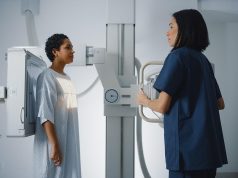No significant differences seen at gene or pathway level according to age; chemotherapy response, survival equivalent by age groups
WEDNESDAY, Aug. 18, 2021 (HealthDay News) — Early-onset colorectal cancer (EO-CRC) appears to be biologically and genomically similar to average-onset (AO) CRC, according to a study published online Aug. 18 in the Journal of the National Cancer Institute.
Andrea Cercek, M.D., from the Memorial Sloan Kettering Cancer Center in New York City, and colleagues compared clinical, histopathologic, and genomic characteristics of EO-CRC patients (divided into age 35 years or younger and 36 to 49 years at diagnosis) with AO-CRC (age 50 years or older at diagnosis). Data were included for 759 patients with EO-CRC (151 aged 35 years or younger at diagnosis; 608 aged 36 to 49 years at diagnosis) and 687 AO-CRC patients.
The researchers found that compared with AO-CRC, EO-CRC more often featured left-sided tumors (80.8 and 83.7 versus 63.9 percent for those aged 35 years or younger and 36 to 49 versus with AO-CRC), rectal bleeding (41.1 and 41.0 versus 25.9 percent), and abdominal pain (37.1 and 34.0 versus 26.8 percent). No differences in histopathologic tumor characteristics were seen among microsatellite stable tumors. Differences in TP53 and receptor tyrosine kinase signaling pathway alterations were noted by age, initially; on multivariable analysis, there were no statistically significant differences at the gene or pathway level. Chemotherapy response and survival were equivalent by age cohorts among advanced microsatellite stable CRCs. In 23.3 percent of patients aged 35 years or younger and 14.1 percent of AO-CRCs, pathogenic germline variants were identified.
“Our results demonstrate that clinical outcomes and response to chemotherapy are the same and that aggressive treatment regimens based solely on the age at CRC diagnosis are not warranted,” the authors write.
Several authors disclosed financial ties to the pharmaceutical industry.
Copyright © 2021 HealthDay. All rights reserved.








